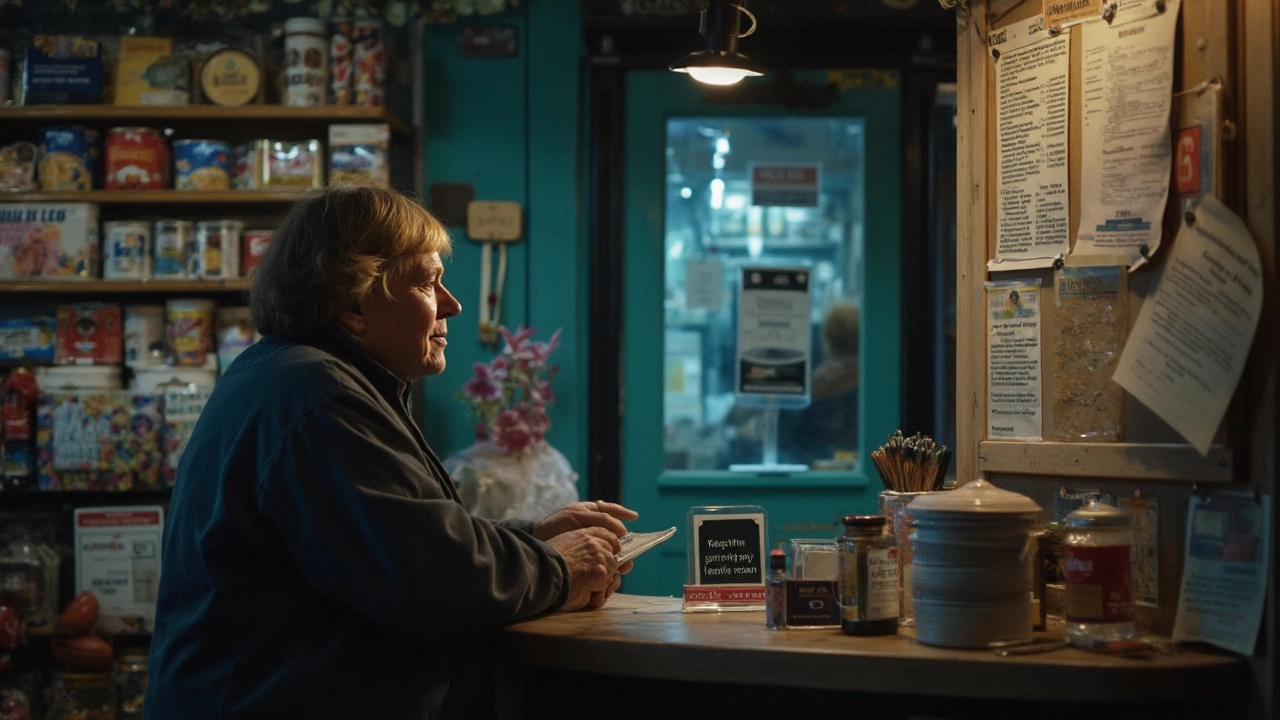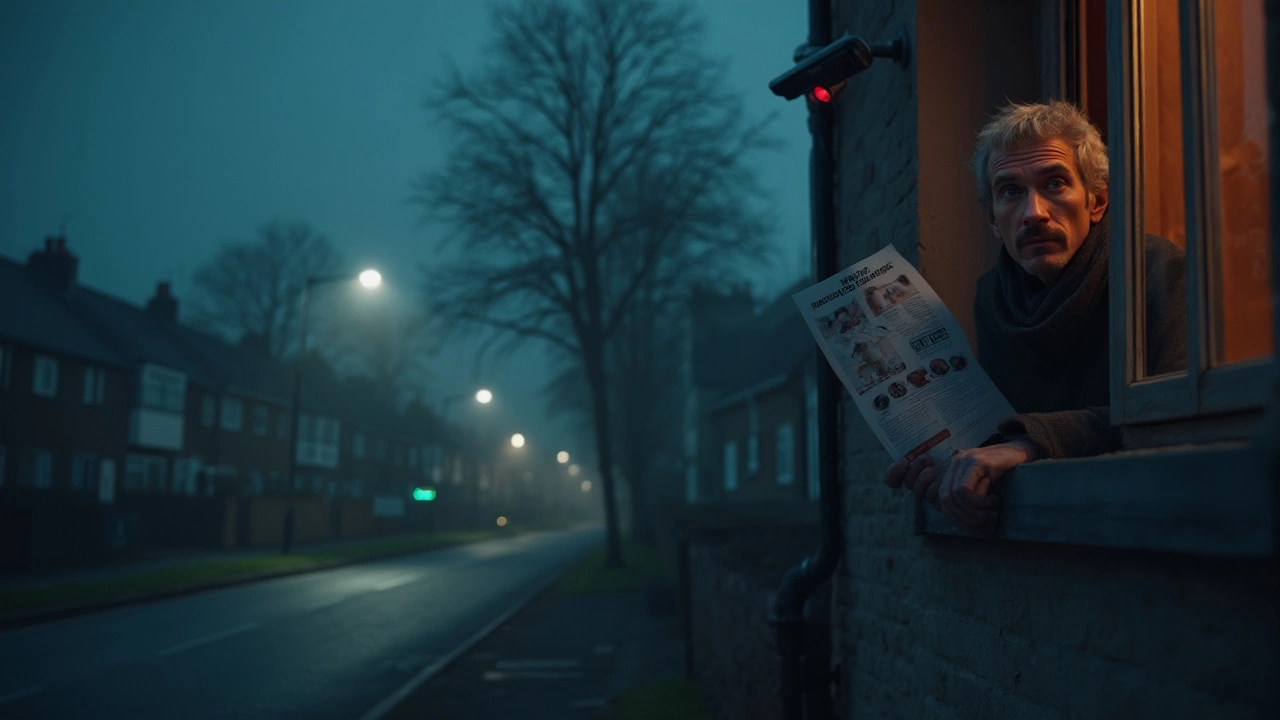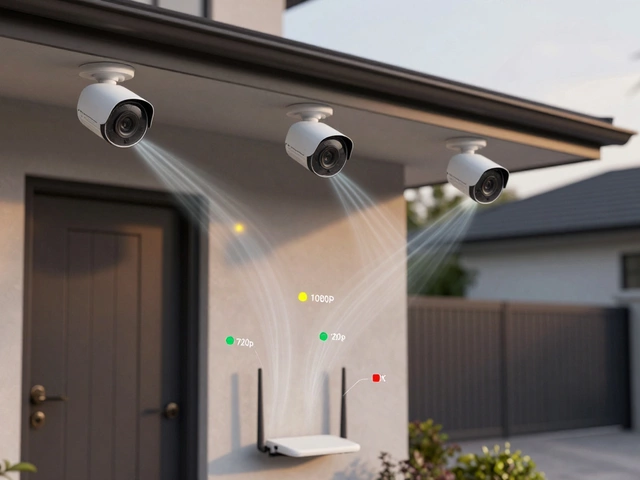Ever thought about installing a night vision camera or using night vision goggles? Before mounting that shiny new gadget, stop for a second—because the laws around night vision tech aren’t as simple as you’d think.
Using night vision cameras to protect your property can sound like a smart move. But where you point those cameras—and what you do with the footage—can get you in trouble if you don’t play by the rules. Not every state or country agrees where the line should be.
Let’s start simple: buying or owning night vision equipment is generally legal in the US and most other countries. The trouble starts when you use it somewhere it isn’t allowed, like peeking into someone’s private space or recording people without their knowledge. Even putting a night vision dashcam in your car? Some places have rules on that, too.
If you want to record at night or just see what’s going on beyond the reach of streetlights, you need to know the basic laws in your area. Ignoring them can lead to fines or even criminal charges. Bottom line: night vision itself isn’t illegal—misusing it can be.
- Why People Want Night Vision Cameras
- Are Night Vision Cameras Legal?
- Where You Can and Can’t Use Them
- Night Driving and Vehicle Laws
- Privacy, Peeping, and the Gray Zones
- Tips for Staying on the Right Side of the Law
Why People Want Night Vision Cameras
Folks aren’t just buying night vision cameras for the cool factor. There’s real demand for being able to see in the dark, and it’s not just for secret agents or wildlife nerds. Everyday people and businesses are grabbing these gadgets for real-world reasons.
The top reason: home security. Most break-ins happen at night or when it’s dark outside. A night vision camera can spot someone sneaking around your yard, driveway, or back door. Regular cameras struggle with low light, but night vision tech uses special infrared light to pick up details you’d totally miss otherwise.
Another big use is business monitoring. Store and restaurant owners want to keep an eye on their property 24/7. According to a 2023 survey by Security Industry Association, over 60% of retail businesses with security cameras say night vision features were a “must-have” when they chose their system.
Wildlife fans and hunters use night vision to spot animals without scaring them off. Farmers have started using these cameras to check on livestock after dark and catch predators in the act. Even delivery services use them to track packages dropped off at night.
Here’s a quick breakdown of where folks are putting these cameras to work:
- Watching driveways and porches for package thieves
- Monitoring parking lots at night
- Checking on pets or livestock in barns and backyards
- Recording wildlife without a flashlight
- Keeping apartments or condos safe after sundown
People love this tech because it gives them peace of mind when most crimes and sneaky stuff happens—under the cover of darkness.
Let’s look at the numbers side by side for a better idea of why everyone wants in on this:
| Use Case | % of Users (2024, US) |
|---|---|
| Home Security | 54% |
| Business Surveillance | 31% |
| Wildlife Watching/Hunting | 9% |
| Farm & Ranch | 5% |
| Other | 1% |
Bottom line—if you want to boost security after dark or catch what your eyes miss at night, night vision cameras are a handy tool.
Are Night Vision Cameras Legal?
Here’s the straight answer: in most of the US, and across a lot of countries, there’s nothing illegal about owning or buying a night vision camera. Walk into a big-box store or search online, and you’ll find plenty for sale without any warning labels or paperwork needed. The rules get strict only when you ask, “How am I planning to use night vision?”
If you plan to install night vision cameras around your home or business to watch over property you own, you’re almost always in the clear. That’s true in almost all states, as long as your cameras aren’t peering into spaces where folks expect privacy—think inside homes, through bathroom windows, or over a neighbor’s fence.
Now, some states take things a bit further. California, for example, bans certain high-powered night vision scopes for firearms, labeling these as military gear. And a few countries, like Australia, require a special permit just to own some advanced night vision tech. Outside the US, the laws can change quickly—always double-check if you’re traveling or shipping gear overseas.
The takeaway? Using a standard night vision security camera on your own property almost never causes legal headaches. The issues start when you point a camera at private spaces or use more advanced equipment for shady reasons. When in doubt, check your state’s privacy and surveillance laws, or just ask a local lawyer. There’s no one-size-fits-all rule, but playing it safe is way easier than dealing with fines or a visit from the cops.
Where You Can and Can’t Use Them
There’s a huge difference between using night vision cameras for security at home and, say, pointing them into your neighbor’s backyard. If you want to stay out of legal trouble, location is everything.
In the US, you’re free to put night vision cameras on your private property—inside or outside—to watch your front door, driveway, or backyard. Most states let you record footage as long as it stays on areas you own or control. But once your camera picks up what’s happening through someone else’s window, you’re crossing the line into illegal surveillance.
Public spaces like streets or parking lots are generally fair game, because there’s no legal expectation of privacy there. But step inside places like locker rooms, hotel rooms, or bathrooms—whether you own the property or not—and it’s strictly off-limits. That’s considered criminal spying in most states, no matter what gear you’re using.
Every state has its own twist on these laws. Here’s a quick look at a few:
| State | Home Ownership Use | Neighbor Surveillance | Recording Public Spaces |
|---|---|---|---|
| California | Allowed (on your property) | Illegal | Allowed |
| Texas | Allowed | Illegal | Allowed |
| New York | Allowed | Illegal | Allowed |
| Illinois | Allowed with notice | Illegal | Allowed |
Workplaces are a special case. Employers in most states can use night vision cameras for security, but they can’t set them up where employees expect privacy—restrooms, changing rooms, or break rooms, for example. By law, staff often have to be told if cameras are in use.
If you live in an apartment, you’re usually OK to put cameras inside your unit. But pointing them down the hallway or common areas? That’s usually up to your landlord or HOA. Always check your lease or building rules before installing anything.
Want to use night vision on public land or in parks? Be careful. Some parks and nature reserves ban surveillance without a permit, especially to protect wildlife or visitor privacy.
- Stick to filming on your own property or public spots.
- Never point cameras at private spaces you don’t own.
- Keep up with local and state laws—they do change.
Bottom line: where you put your night vision setup matters just as much as how you use it. Double-check what’s legal where you live before you hit record.

Night Driving and Vehicle Laws
Lots of folks ask if they can use night vision gear while driving. It sounds high-tech and handy—seeing farther in the dark should make the roads safer, right? But when it comes to cars, trucks, and motorcycles, things get a bit complicated.
First, it’s 100% legal to buy night vision dashcams or rear cameras, and you can have them installed pretty much everywhere in the US. Even luxury cars from companies like BMW or Mercedes sometimes offer night vision as a built-in safety feature. But where you hit a wall is with handheld night vision goggles or scopes while actually driving—that’s a no-go in most states. Law enforcement will absolutely pull you over if they spot you wearing goggles behind the wheel, and you could get hit with a distracted driving charge or worse. In some places, especially in Europe or Canada, using or mounting aftermarket night vision that projects images onto your windshield or blocks your view can get you a ticket for unsafe driving, too.
Different devices have different rules. Here’s a simple breakdown:
- Dashcams with night vision: Legal to use, as long as they don’t block your view or record other drivers in places with strict privacy rules.
- Aftermarket night vision heads-up displays: Sometimes not allowed, because they can hide or distract from the road.
- Wearing night vision goggles while driving: Off-limits almost everywhere for civilian drivers.
Here’s a quick look at a few common places and their approach:
| Country/State | Legal Status | Notes |
|---|---|---|
| California, USA | Dashcam okay | Device must not obstruct windshield |
| Texas, USA | Dashcam okay | No problem if not blocking view |
| Germany | Built-in night vision okay | Aftermarket displays restricted |
| Ontario, Canada | Dashcam okay | No goggles or blocking devices |
One tip: Always check if your night vision device could distract you or cover your view of the road. And in some states, if you’re driving for a rideshare or a taxi, recording inside the vehicle may need consent from passengers—especially at night when infrared gets involved. If you’re unsure, call your local DMV or check with the state police—they’ll give you the straight answer. Bottom line? Night vision dashcams are usually fine, but anything that messes with your sight line or focus can lead to trouble.
Privacy, Peeping, and the Gray Zones
This is where things get sticky. Just because you own a night vision camera doesn’t mean you can aim it anywhere you like. The big problem? Privacy laws. You can film what’s yours, but the second your lens slips into someone else’s backyard, bedroom, or bathroom window, you’re probably breaking the law.
Take the United States: It’s legal to use a night vision camera on your property. But if you record someone without their consent in a place where they expect privacy, that’s illegal in every state. In California, secret filming can land you with a hefty fine or even a year in jail. About 38 states have laws that go after people who use cameras to spy on others in private places, even if it’s just with regular cameras—add night vision and you’re more likely to get caught.
Some tech can even make it easier to cross the line. With night vision cameras on doorbells, drones, or even binoculars, it’s simple to zoom past property lines, sometimes without realizing. Lawmakers are still catching up, and rules can change quickly.
Here’s where the gray areas show up:
- Night vision through windows—if you’re accidentally catching your neighbor in their kitchen from your own backyard, courts might treat it differently than if you purposely zoomed in on their bedroom.
- Recording in public spaces—no problem, unless you turn the camera on a spot where people expect privacy, like a bathroom stall at a park.
- Audio recording—super risky. Many states demand two-party consent for audio, so turning on your camera mic could escalate things even if video recording is okay.
Cases and local laws really matter here. For example, New York prosecutors have charged people with unlawful surveillance for using night vision gear to spy on others, even with partial nudity or through blinds. The stakes get even higher if you post or share footage online.
| Location | Private Places Protected | Max Penalty |
|---|---|---|
| California | Bathrooms, bedrooms, changing areas | 1 year in jail & $2,000 fine |
| Texas | Dwellings, restrooms, locker rooms | Up to 2 years in prison & $10,000 fine |
| UK | Private homes, changing rooms | Unlimited fines; prison for repeat offenders |
The safest play? Point your camera at your own stuff, avoid windows, and put up clear signs if you’re recording. If you’re unsure, check state or local laws before you set up anything that can see in the dark. A five-minute read now can save you a big headache down the line.
Tips for Staying on the Right Side of the Law
Want to use night vision cameras without running into legal headaches? Most of the laws that trip people up are about privacy, not the cameras themselves. Here’s how you can keep things safe and legal while still making the most of your gear.
- Know the Law Where You Live: Every state has its own take on surveillance and privacy. For example, California is big on privacy—recording someone in their home without their okay is illegal. Texas is more relaxed, but you still can’t point a camera into someone’s window. Take five minutes to Google your state’s surveillance laws before setting up.
- Don’t Record Where People Expect Privacy: Bathrooms, bedrooms, inside vehicles, and fenced yards are classic “private” zones. A good rule: if you wouldn’t want someone filming you there, don’t do it to others.
- Use Visible Signage: If you’ve installed night vision at home or work, hang up clear signs that say surveillance is happening. It doesn’t just help you legally; signs actually cut down on trespassing by up to 20%, according to a 2022 home security report.
- Avoid Audio Recording Unless You’re Absolutely Sure: A lot of states have stricter rules about recording sound. While filming might be fine, recording someone’s voice can be illegal, especially without both parties’ consent. If your camera has a mic, double check local eavesdropping laws.
- Never Point Cameras at Areas You Don’t Own: Your camera should only cover your property—the line stops at your neighbor’s fence. Police have issued fines after people posted videos that showed too much of the sidewalk or neighboring homes.
- Be Careful with Portable Night Vision Gear: Taking night vision goggles or monoculars to concerts, sporting events, or public spaces can get you in trouble. Venues often ban recording devices, and some events have their own strict rules about night vision tech.
| Legal Issue | States Most Strict | Potential Penalty |
|---|---|---|
| Recording in private places | California, New York, Illinois | Criminal charges, $1,000–$5,000 fines |
| Audio recording without consent | Florida, Massachusetts, Maryland | Fines, possible jail time |
| Surveillance of public areas (sidewalks/street) | Washington, Oregon | Camera removal, city fines |
Bottom line: Just because you night vision is legal to own doesn’t mean you can point it anywhere you like. Check your state and local laws, respect private spaces, and you’ll be good to go. If you’re unsure, ask a local attorney or call your local police department—they usually have quick answers about home or business surveillance rules.


